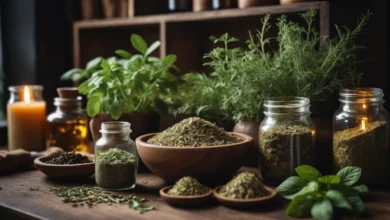Effective Remedies for Relieving Joint Pain at Home

Joint pain can significantly impact your quality of life, making everyday activities feel daunting. Whether caused by arthritis, injury, or aging, finding effective relief is essential. While consulting a healthcare professional is crucial for persistent pain, numerous remedies can help alleviate discomfort right at home. In this article, we’ll explore effective remedies for relieving joint pain, empowering you to regain control of your mobility and comfort.
Understanding Joint Pain
Joint pain occurs when inflammation, injury, or wear and tear affects the joints—areas where bones meet. Common causes include osteoarthritis, rheumatoid arthritis, bursitis, and tendinitis. Symptoms often include swelling, stiffness, and limited range of motion. While many treatments are available, natural and home remedies can complement medical advice and provide significant relief.
1. Hot and Cold Therapy: The Dual Approach
Using heat and cold is a straightforward yet effective way to manage joint pain.
- Heat Therapy: Applying heat can help relax muscles and improve circulation, reducing stiffness. Use a heating pad or warm towel on the affected joint for 15-20 minutes to soothe pain and increase blood flow.
- Cold Therapy: Cold packs help numb the area, reducing swelling and inflammation. Apply an ice pack wrapped in a cloth to the painful joint for about 15-20 minutes to alleviate discomfort, especially after activity.
2. Essential Oils: Nature’s Pain Relievers
Aromatherapy with essential oils offers a natural approach to managing joint pain. Oils such as eucalyptus, peppermint, and ginger possess anti-inflammatory and analgesic properties.
To use, dilute a few drops of your chosen essential oil with a carrier oil like coconut or olive oil and gently massage it into the affected joint. The soothing scent and therapeutic properties can provide relief while promoting relaxation.
3. Turmeric: The Golden Spice for Inflammation
Turmeric, a bright yellow spice, contains curcumin, known for its powerful anti-inflammatory effects. Studies show that turmeric can help reduce joint pain and improve mobility in those with arthritis.
You can incorporate turmeric into your diet by adding it to curries, soups, or smoothies. For a more concentrated effect, consider taking turmeric supplements after consulting with a healthcare professional.
4. Ginger: A Natural Anti-Inflammatory
Similar to turmeric, ginger is another potent anti-inflammatory spice that may help alleviate joint pain. Its compounds, such as gingerol, possess properties that can reduce swelling and stiffness.
You can enjoy ginger as a tea by boiling fresh ginger slices in water for 10-15 minutes. Sweeten with honey or lemon for added flavor and health benefits. Additionally, adding fresh or powdered ginger to your meals can enhance your diet while offering pain relief.
5. Epsom Salt Baths: Soak Away the Pain
Epsom salt contains magnesium sulfate, which can help reduce inflammation and relax sore muscles. Taking an Epsom salt bath can be a soothing remedy for joint pain.
Add two cups of Epsom salt to warm bath water and soak for 15-20 minutes. The warmth of the water combined with the Epsom salt can help relieve tension and promote relaxation.
6. Physical Activity: Keep Moving
While it may seem counterintuitive, gentle exercise can help reduce joint pain and improve flexibility. Engaging in low-impact activities like walking, swimming, or yoga can strengthen muscles around the joints, enhancing stability and reducing discomfort.
Aim for at least 150 minutes of moderate exercise each week, incorporating flexibility and strength training to support joint health. Always listen to your body and adjust activities as needed to avoid exacerbating pain.
7. Maintain a Healthy Weight: Joint Support
Excess weight can put additional stress on your joints, particularly weight-bearing joints like the knees and hips. Maintaining a healthy weight can significantly reduce joint pain and improve mobility.
Focus on a balanced diet rich in fruits, vegetables, whole grains, and lean proteins. Consider consulting with a nutritionist for personalized dietary advice that aligns with your health goals.
Frequently Asked Questions About Joint Pain Relief
Q: How quickly can I expect to feel relief from these remedies?
A: The time it takes to experience relief can vary depending on the remedy and individual circumstances. Many people notice improvements within a few days to weeks with consistent use of natural remedies.
Q: Are there any side effects associated with these remedies?
A: Most natural remedies are safe, but it’s essential to consult with your healthcare provider, especially if you have underlying health conditions or are taking medications.
Q: Can these remedies replace my prescribed medication?
A: While natural remedies can complement your treatment, they should not replace prescribed medications without consulting your healthcare provider.
Q: Is it safe to exercise with joint pain?
A: Yes, gentle, low-impact exercises can be beneficial for joint health. However, consult with your healthcare provider before starting any new exercise regimen.
Q: When should I seek professional help for joint pain?
A: If your joint pain persists, worsens, or significantly impacts your daily life, it’s crucial to consult a healthcare professional for further evaluation and treatment.
Conclusion: Take Charge of Your Joint Health
Joint pain can be debilitating, but with the right approach, you can find relief and improve your quality of life. Utilizing home remedies like hot and cold therapy, essential oils, turmeric, ginger, Epsom salt baths, and maintaining a healthy weight are practical steps to alleviate discomfort. Remember to listen to your body, stay active, and consult healthcare professionals when necessary. Empower yourself with these effective remedies to reclaim your mobility and enjoy a more active lifestyle.





